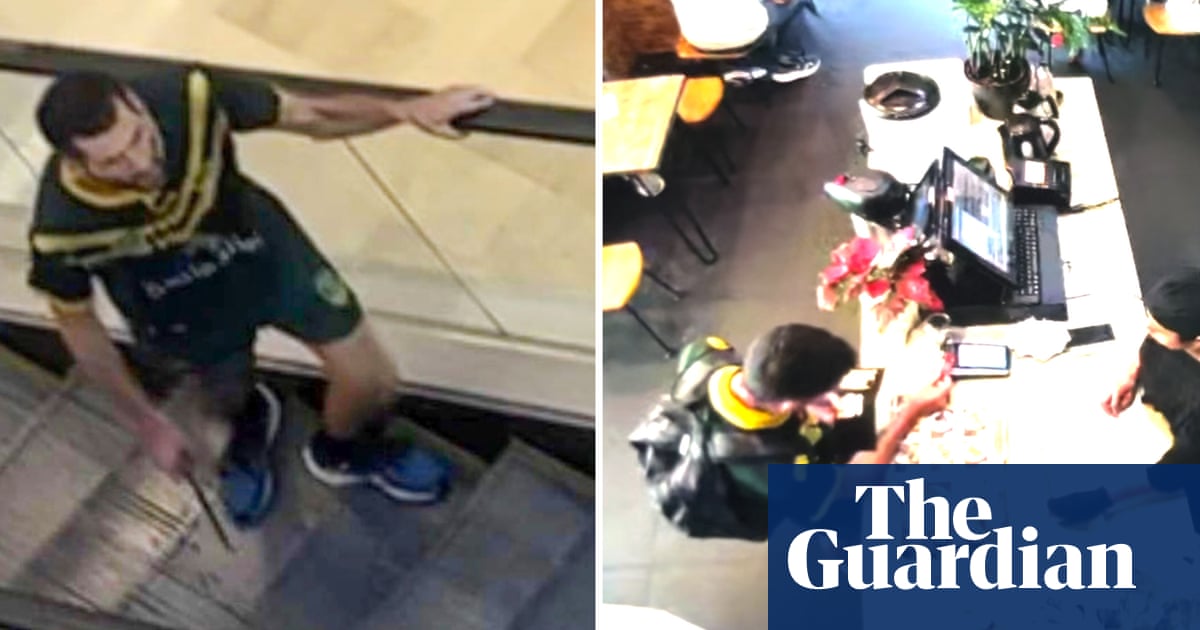Joel Cauchi called the police to his parents’ home more than a year before he stabbed and killed six people at Bondi Junction, to complain that his father had taken away his knives due to concerns about his mental health, an inquest has been told.
Body-worn camera footage played at the coronial inquest in Sydney on Monday showed an officer telling her colleague, after speaking to Cauchi’s mother, that “Mum just wants him to get help”.
“She’s like ‘Yeh he’s not getting his knives because who knows, who knows what’s going on, especially if he’s going to lose contact with reality,” the Queensland officer said in Toowoomba in January 2023.
The court heard that one of the responding officers later sent an email to a police mental health team requesting a follow-up, but that email was allegedly “lost” and no follow-up occurred.
The inquest, scheduled for five weeks, is examining the stabbing of six people by Cauchi, who had schizophrenia, at Westfield in Bondi Junction in April 2024.
Cauchi, then 40, killed Ashlee Good, 38, Jade Young, 47, Yixuan Cheng, 27, Pikria Darchia, 55, Dawn Singleton, 25, and Faraz Tahir, 30, and injured 10 others at the shopping centre on 13 April last year before he was shot and killedby police inspector Amy Scott.
On Monday, officers from Queensland police gave evidence about the early warning signs of Cauchi’s deteriorating mental health – and the force’s response.
Two officers responded after Cauchi called the police to his home in January 2023 after his father confiscated what Cauchi called his “collector knives”.
At that time, Cauchi had not been on his medication for his schizophrenia for five years, the court was told. Before that, he had been medicated since he was 17.
Cauchi was waiting on the front lawn outside his parents’ suburban Toowoomba home when the police arrived, the body-worn camera footage showed.
The police officer described Cauchi, who appeared relaxed and friendly, as “quite reasonable to talk to” when later talking to another officer.
Cauchi had explained to the officer: “My dad has taken some of my property … and he will not give it back. I tried to negotiate, but he is not willing.”
The police officer asked if there was a reason his father took the knives away, and Cauchi responded that he did not know.
The officer, describing the interaction to the court, said Cauchi appeared “fixated on those knives”.
The officer searched Cauchi on the police database while speaking with him and saw an alert that he was diagnosed with schizophrenia and was a weapons holder, the inquest was told.
The officer later asked how Cauchi’s mental health had been. He responded: “It’s been very good.” Cauchi also told the officer his medication was “dropped down”.
At the same time, another female officer spoke to Cauchi’s mum. The court heard, via her body-worn camera footage, that Cauchi had reportedly “laid hands” on his 75-year-old father in an attempt to get the knives back.
“Part of his delusion is not thinking clearly,” the officer told her colleague when recounting the conversation with Cauchi’s mother. “He’s not made any threat to harm anyone, but he’s up at 3am and he’s pacing around and being disruptive.”
Sign up toMorning Mail
Our Australian morning briefing breaks down the key stories of the day, telling you what’s happening and why it matters
after newsletter promotion
“She’s just so tired and exhausted.” That officer referred to the knives as “pigging knives”.
The court heard Cauchi’s parents had only planned to keep the knives until they were satisfied their son’s mental health had improved.
Someone was coming to the house the following day to “try and figure out where he can live”.
The officer who spoke to Cauchi then returned to him and said: “They’re just a little bit concerned about your mental health” and that they weren’t taking the knives off him “permanently”.
“They just want to make sure you’re OK is all,” the officer told him. Cauchi responded: “Well, I’m perfectly fine.”
The next day, Cauchi brought a new knife from a camping store, the court heard.
The officer who spoke to Cauchi during the call-out told the court that the number of mental health-related call-outs generally had “increased a lot”.
He was trained “very briefly” to respond to mental health incidents when attending the academy prior to beginning in the force in 2005, but had “no direct training” since.
He had sent an email the morning after the call-out to Cauchi’s home to the mental health incident coordinator, describing the incident. He concluded the email: “If a follow-up could be made that would be great.”
The court heard there was no follow-up and that email was “lost”.
Six weeks after the January 2023 call-out, Cauchi made another criminal complaint to the police about his father allegedly stealing his knives. The initial attending officer told the court he was not aware of that subsequent incident and only learned about it after the “tragic” Bondi Junction mass stabbing.
The inquest continues.
